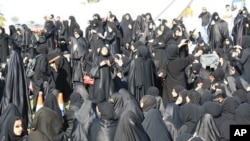Thousands of opposition supporters united in Bahrain’s capital on Tuesday after a series of protests throughout the country left two people dead.
Protesters began flooding into a main traffic roundabout in Manama in the late afternoon despite a crackdown the day before when police used tear gas, rubber bullets and bird shot to disperse peaceful demonstrators in a number of places.
Ali Abdulhadi Mushaima, 21, was killed Monday, and security forces killed a second man Fadel al-Matrook, 31, at Tuesday's funeral for the first victim.
The protests are organized by Bahrain's majority Shi’ite Muslims who say they are treated like second-class citizens and not given the same benefits as the county’s Sunni ruling minority.
Their main demands were for a new constitution, the release of political prisoners, an end to discrimination and an end to the naturalization of foreign citizens.
But public relations officer at the Bahrain Center for Human Rights, Sa'id Yusif Almuhafdah, says protesters have changed their calls since the two deaths.
"Yesterday they [protesters] were asking to reform the government," he said. "Now, they are asking to change the government, so they have changed their demands and their targets."
A large number of demonstrators marched directly from Ali Abdulhadi Mushaima’s funeral on Tuesday to the Pearl Roundabout, chanting for King Hamad bin Isa al-Khalifa to step down.
Abbas al-Oribi was one of them. He says he does not make enough money to support his family and is willing to do whatever it takes to bring about change.
"Even if the police come, we are here, we will open our chest for the bullet," he said. "We are ready to get the bullet. We have no scare in our heart."
Mohemmad Hubail, who was also protesting, had similar words.
"We are not afraid of anything right now," said Hubail. "If they attack us we will stay here. We will die for our country, that’s what we are here for."
Bahrain’s Ministry of Interior offered condolences to the family of the man killed Monday, and said legal action would be taken if the use of force was found to be unjustified.




